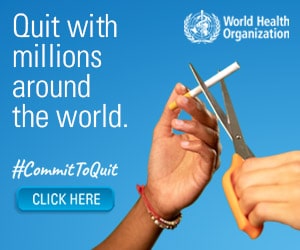The saying goes that “quitters never win,” but in the case of tobacco, quitters are the real winners. However, without adequate support to keep you motivated, quitting can be incredibly challenging for people.
In Nigeria, there are 5.2 million tobacco users aged 15+. 4.9M of these people are male and 300k are female. No matter what your age or gender, it’s not too late to stop using tobacco.
When the news came out that smokers were more likely to develop severe disease with COVID-19 compared to non-smokers, it triggered millions of smokers to want to quit tobacco.
“Smokers face a 50% higher risk of serious illness and death from COVID-19 than the general population, so quitting smoking is the best thing smokers can do to reduce their risk from coronavirus, as well as the risk of cancer, heart disease and respiratory diseases,” said Dr Tedros Adhanom Ghebreyesus, WHO Director-General. “We urgently call on all countries to join hands in this WHO campaign and create a tobacco-free environment and provide information, support and tools to those who need to quit smoking. , . and quit smoking forever”.
The nicotine found in tobacco is highly addictive and creates dependence. The behavioural and emotional ties to tobacco use – like having a cigarette with your coffee, craving tobacco, feelings of sadness or stress – make it hard to kick the habit.
With access to professional support and cessation services, tobacco users double their chances of quitting successfully. Currently, over 70% of the 1.3 billion tobacco users worldwide lack access to the tools they need to quit successfully. The gap in access to cessation services is only further exacerbated in the last year as the health workforce has been mobilized to handle the pandemic. That’s why WHO launched a year-long campaign for World No Tobacco Day’s – “Commit to Quit” theme. The campaign aims to empower 100 million tobacco users to make a quit attempt by creating networks of support and increasing access to services proven to help tobacco users quit successfully.
Also Read: 10,000 Volunteers For Tokyo Olympics Quit
This will be achieved by scaling-up existing services such as brief advice from health professionals and national toll free quit lines, as well as launching innovative services like Florence, WHO’s first digital health worker, and chatbot support programmes on WhatsApp, Facebook Messenger, WeChat and Viber to send daily advice and encouragement for up to 6 months to help users quit smoking completely.
E-cigarettes are not proven cessation aids
The tobacco industry has continuously attempted to subvert these life-saving public health measures. Over the last decade, the tobacco industry has promoted e-cigarettes as cessation aids under the guises of contributing to global tobacco control. Meanwhile, they have employed strategic marketing tactics to hook children on this same portfolio of products, making them available in over 15,000 attractive flavours.
The scientific evidence on e-cigarettes as cessation aids is inconclusive and there is a lack of clarity as to whether these products have any role to play in smoking cessation. Switching from conventional tobacco products to e-cigarettes is not quitting.
“We must be guided by science and evidence, not the marketing campaigns of the tobacco industry – the same industry that has engaged in decades of lies and deceit to sell products that have killed hundreds of millions of people”, said WHO Director-General Dr Tedros Adhanom Ghebreyesus. “E-cigarettes generate toxic chemicals, which have been linked to harmful health effects such as cardiovascular disease & lung disorders.”
There has never been a better time to quit tobacco, and commitment to helping tobacco users quit is critical to improving health and saving lives.
Pledge to quit tobacco today.







